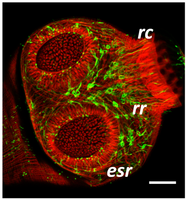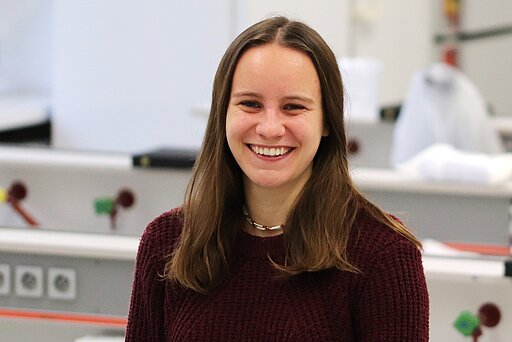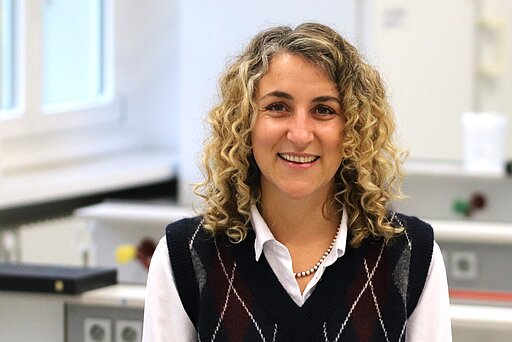Parasitology/Echinococcus (Brehm lab)

Parasitic flatworms (cestodes and trematodes) are a major cause of human disease world-wide. Our group investigates host-parasite interaction mechanisms as well as parasite molecular-, cell-, and developmental biology using the cestode model system Echinococcus multilocularis. The metacestode larval stage of this tapeworm causes the lethal disease alveolar echinococcosis (AE) through extensive cancer-like growth within the host liver, accompanied by suppression of the host immune system. AE treatment causes enormous problems since only few cases are amenable to surgical treatment and many patients have to undergo life-long chemotherapy. Our group has previously characterized the E. multilocularis genome, showed that parasite growth is decisively driven by totipotent somatic stem cells, and demonstrated that formation of the unusual metacestode stage is a result of the modification of the parasite’s body axes. The proliferation dynamics of the Echinococcus stem cell population and cellular signalling systems governing larval stage differentiation are at the focus of our research interests. We also extensively study parasite genomics/transcriptomics and engage in the development of forward genetic methodology for flatworm parasites. Finally, immune-modulatory activities of the Echinococcus metacestode stage and the development of novel chemotherapeutics against the disease are investigated.
Monika Bergmann
Technical assistant
Tel.: +49 931-31-46913
Mail: monika.bergmann(at)uni-wuerzburg.de

Prof. Dr. rer. nat. Klaus Brehm
Group leader
Tel.: +49 931-31-46168
Mail: klaus.brehm(at)uni-wuerzburg.de

Philippa Brosch
PhD student







Zoe Nordhause
Trainee Biology Laboratory Technician
Tel.: +49 931 31-87946
Mail: zoe.nordhause(at)uni-wuerzburg.de

Tsai, I.J., Zarowiecki, M., Holroyd, N., et al., Olson, P.D., Laclette, J.P.*, Brehm, K.*, Berriman, M.*, 2013. The genomes of four tapeworm species reveal adaptations to parasitism. Nature 496, 57–63. https://doi.org/10.1038/nature12031
Brehm, K.*, Koziol, U.*, 2017. Echinococcus-Host Interactions at Cellular and Molecular Levels. Adv. Parasitol. 95, 147–212. https://doi.org/10.1016/bs.apar.2016.09.001
Hemer, S., Konrad, C., Spiliotis, M., Koziol, U., Schaack, D., Förster, S., Gelmedin, V., Stadelmann, B., Dandekar, T., Hemphill, A., Brehm, K.*, 2014. Host insulin stimulates Echinococcus multilocularis insulin signalling pathways and larval development. BMC Biol. 12, 5. https://doi.org/10.1186/1741-7007-12-5
Koziol, U., Jarero, F., Olson, P.D., Brehm, K.*, 2016. Comparative analysis of Wnt expression identifies a highly conserved developmental transition in flatworms. BMC Biol. 14, 10. https://doi.org/10.1186/s12915-016-0233-x
Nono, J.K., Lutz, M.B.*, Brehm, K.*, 2020. Expansion of Host Regulatory T Cells by Secreted Products of the Tapeworm Echinococcus multilocularis. Front. Immunol. 11, 798. https://doi.org/10.3389/fimmu.2020.00798
Gelmedin, V., Caballero-Gamiz, R., Brehm, K.*, 2008. Characterization and inhibition of a p38-like mitogen-activated protein kinase (MAPK) from Echinococcus multilocularis: antiparasitic activities of p38 MAPK inhibitors. Biochem. Pharmacol. 76, 1068–1081. https://doi.org/10.1016/j.bcp.2008.08.020
Brehm, K.*, Jensen, K., Frosch, M., 2000. mRNA Trans-splicing in the Human Parasitic Cestode Echinococcus multilocularis. J. Biol. Chem. 275, 38311–38318. https://doi.org/10.1074/jbc.M006091200
Förster, S., Koziol, U., Schäfer, T., Duvoisin, R., Cailliau, K., Vanderstraete, M., Dissous, C., Brehm, K.*, 2019. The role of fibroblast growth factor signalling in Echinococcus multilocularis development and host-parasite interaction. PLoS Negl Trop Dis 13, e0006959. https://doi.org/10.1371/journal.pntd.0006959
Macchiaroli, N., Preza, M., Pérez, M.G., Kamenetzky, L., Cucher, M., Koziol, U., Castillo, E., Berriman, M., Brehm, K.*, Rosenzvit, M.C.*, 2021. Expression profiling of Echinococcus multilocularis miRNAs throughout metacestode development in vitro. PLoS Negl Trop Dis 15, e0009297. https://doi.org/10.1371/journal.pntd.0009297
Schubert, A., Koziol, U., Cailliau, K., Vanderstraete, M., Dissous, C., Brehm, K.*, 2014. Targeting Echinococcus multilocularis stem cells by inhibition of the Polo-like kinase EmPlk1. PLoS Negl Trop Dis 8, e2870. https://doi.org/10.1371/journal.pntd.0002870
*corresponding author
Further publications of the research group on Pubmed


